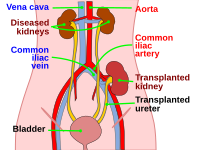
Photo from wikipedia
Recurrence of anti-glomerular basement membrane (anti-GBM) glomerulonephritis in the kidney graft is a rare event, described in limited case reports and registry analysis. The aim of this study was to… Click to show full abstract
Recurrence of anti-glomerular basement membrane (anti-GBM) glomerulonephritis in the kidney graft is a rare event, described in limited case reports and registry analysis. The aim of this study was to evaluate in a large cohort of patients with detailed data collection and long follow-up the risk of recurrence of anti-GBM disease and graft loss caused by recurrence, the risk factors associated with clinical recurrence and the long-term patient and graft survival. Multicenter retrospective study. Inclusion criteria: patients with anti-GBM glomerulonephritis transplanted with a kidney between 1977 and 2015. Exclusion criteria: systemic vasculitis (except ANCA), lupus erythematosus and cryoglobulinemia. Clinical recurrence was defined as reappearance of signs of glomerulonephritis along with histological signs of proliferative glomerulonephritis and linear IgG staining on kidney biopsy, with or without anti-GBM antibodies. Fifty-three patients were included. Clinical recurrence in a first kidney transplant occurred in only one patient five years after transplantation -a prevalence rate of 1.9%- in the context of cessation of immunosuppressive drugs. The graft was lost due to recurrence. Histological recurrence with linear IgG staining on kidney biopsy in the absence of histologic signs of proliferative glomerulonephritis was observed in four patients, in the context of cellular rejection. Two patients lost their kidney graft from severe acute rejection; the others fully recovered. Patient survival was 100%, 94% and 89% at 5, 10 and 15 years, respectively. Overall, death-censored first graft survival rates were 88%, 83% and 79% at 5, 10 and 15 years, respectively. Recurrence rate of anti-GBM glomerulonephritis after transplantation is very low, and associated with graft loss. The long-term patient and graft survival rates are excellent.
Journal Title: Nephrology Dialysis Transplantation
Year Published: 2021
Link to full text (if available)
Share on Social Media: Sign Up to like & get
recommendations!